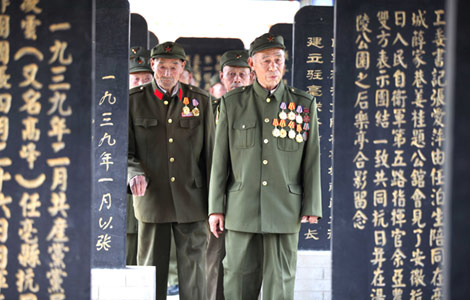Abe's visit to shrine to further dent China-Japan ties
Updated: 2012-10-17 19:24
(Xinhua)
|
||||||||
BEIJING - Japanese opposition leader Shinzo Abe's visit of a controversial Tokyo war shrine on Wednesday afternoon was the latest of a flurry of Japan's provocative moves against China, and would further poison bilateral ties.
The visit hurt the feelings of both the Chinese people and citizens of some other Asian countries, who suffered brutal Japanese invasion and governance during World War II (WWII).
A former prime minister from 2006-2007, the 58-year-old Abe is most likely to retake the post if his Liberal Democratic Party wins general elections due to be held within a year.
While the visit might help Abe collect more votes, his tough stance against China, typical for the hawkish rightist Japanese politician, would only bring himself more trouble once he starts to deal with the thorny Sino-Japanese relations.
Japan's provocative handling of the territorial disputes with China over the Diaoyu Islands in East China Sea has angered Beijing, triggered public protests across major Chinese cities and brought bilateral ties to a new historical low.
Strained political ties have produced serious economic fallout for both sides, as bilateral tourism and trade have considerably lowered.
At such a delicate moment, Abe's visit to Yasukuni Shrine, which honors 2.5 million Japanese war dead, including 14 leading WWII war criminals, has added insult to injury and dealt another blow to the already fragile Sino-Japanese relations.
Moreover, Abe earlier said he regretted not having prayed at Yasukuni Shrine as prime minister, leaving open the possibility of revisiting the shrine if he reclaims the post.
However, it was exactly Abe, who, during his office as prime minister, scrambled to mend fences with China after his predecessor Junichiro Koizumi infuriated Beijing with his repeated visits of the same war shrine.
At that time, Abe refrained from visiting it, and made an "ice-breaking" visit to Beijing in October 2006 -- the first Japanese prime minister to pick Beijing as the first stop of foreign visits instead of the United States.
His somewhat mild tone on China six years ago now seems to have disappeared, just like his laudable political pragmatism in unraveling issues with China.
History has showed that friendship between China and Japan benefits both countries, while certain Japanese politicians' provocative and short-sighted actions would harm the interests of Japan and its people.
To avoid such consequences, those politicians should immediately stop such movements and do more things conducive to bilateral ties.











